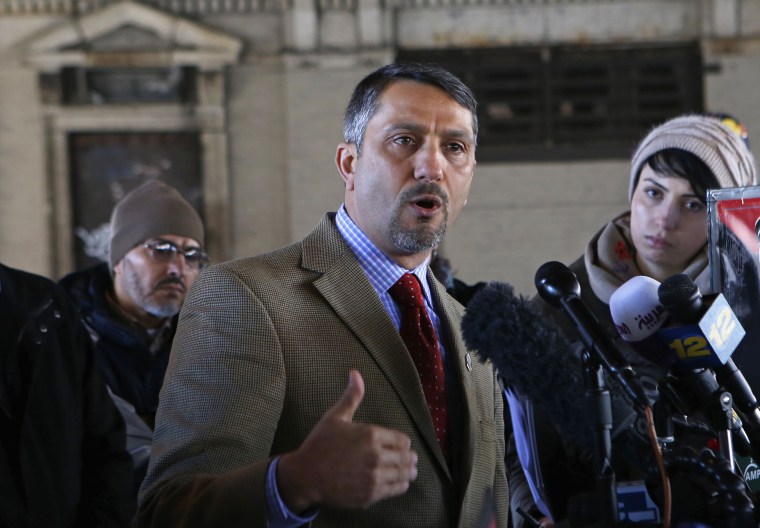Who’s behind the pro-Palestinian protests in the U.S.?
Jewish Voice for Peace has organized hundreds of protests across the country with tens of thousands of participants since the invasion of Gaza. While its events are generally peaceful, it has come under criticism for some actions, including inviting convicted terrorist Rasmea Odeh to speak at a national event in 2017.
Odeh’s supporters say Israel tortured her into a false confession. Odeh was a founding member of the Chicago chapter of the U.S. Palestinian Community Network before U.S. officials deported her in 2017 for failing to disclose a terrorism conviction in Israel.
Stefanie Fox, Jewish Voice for Peace’s executive director, said people must think critically about the U.S. government’s history of applying the word “terrorism” to specific communities. “International law recognizes the rights of occupied peoples to resist their oppression, including through the use of force within clear parameters that always protect civilians in conflict,” Fox said.
In 2020, Zoom, Facebook and YouTube shut down an online event featuring Leila Khaled, a Palestinian activist who spent time in prison for hijacking planes. In a statement condemning censorship, Jewish Voice for Peace called her a “Palestinian resistance icon” and slammed the tech companies.
According to congressional testimony, public statements and interviews, current and former government officials in the U.S., Europe, Israel and Canada claim that some leaders of the pro-Palestinian protest movement promote rhetoric from Hamas or the Popular Front for the Liberation of Palestine, or PFLP. They also say some groups work with members of the PFLP. The State Department has designated both groups as terrorist organizations.
On and after the Oct. 7 attacks, when about 1,200 people were killed and more than 240 were taken hostage, the PFLP’s military wing, the Abu Ali Mustafa Brigades, claimed on Telegram that it had participated in the carnage. It urged other Palestinians to join it. Federal investigators in Washington, D.C., said they do not dispute the PFLP’s claim that it participated in the attack.
Jonathan Schanzer, a former Treasury Department official, called for more aggressive investigation of ties between pro-Palestinian groups in the U.S. and terrorist organizations in testimony to Congress in November.
“Individuals who previously worked for Hamas charities are now a driving force behind the large pro-Hamas demonstrations taking place in major cities across America,” said Schanzer, who is now senior vice president at the Foundation for Defense of Democracies.
Schanzer cited Hatem Bazian, a longtime lecturer at the University of California Berkeley, as an example. Bazian founded the national branch of Students for Justice in Palestine to focus on campus-based activism, and he later launched American Muslims for Palestine. Both groups advocate for the U.S. government to end its support of Israel.

Schanzer argued that Bazian and his organizations are part of a network that is “providing training, talking points, materials and financial support to students intimidating and threatening Jewish and pro-Israel students on college campuses.”
The attorney general’s office of Virginia, where American Muslims for Palestine is headquartered, also opened an investigation of the group after an Israeli American family accused it of potentially using funds to benefit terrorist organizations.
The attorney general’s office said it could not comment on an open investigation. Bazian said the allegations from Capitol Hill and Virginia are false.
“You are guilty because you passed by someone who was eating a shawarma, who is connected to somebody who lives in Gaza, who knows somebody who might be a member of Hamas,” Bazian said. “That’s basically where we are at.”
Samidoun
Officials concerned about hidden links to terrorist groups point to a little-known international organization called Samidoun, the Arabic word for “steadfast.”
On its website, the Canadian-registered nonprofit group describes itself as “an international network of organizers and activists working to build solidarity with Palestinian prisoners in their struggle for freedom.”
But the Israeli government and several think tanks in Europe and Israel say Samidoun’s leadership is composed of current and former members of the PFLP. Germany banned Samidoun a few weeks after the Oct. 7 attacks, arguing that Samidoun members had praised and supported Hamas during street protests.
Read More: Who’s behind the pro-Palestinian protests in the U.S.?

